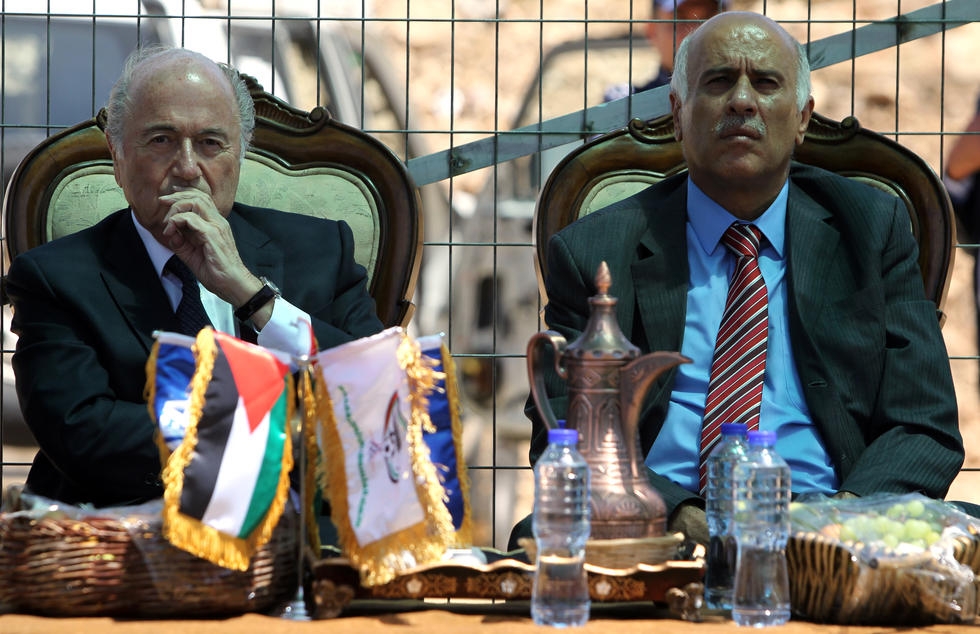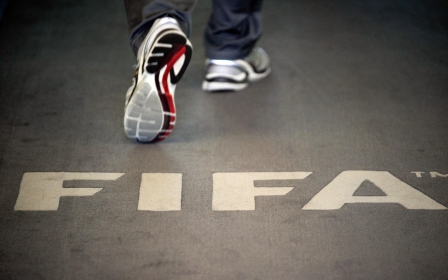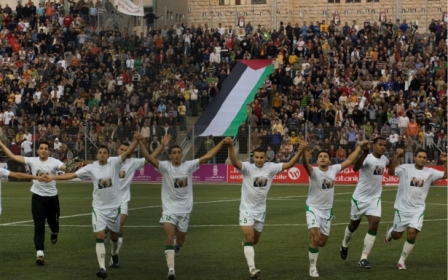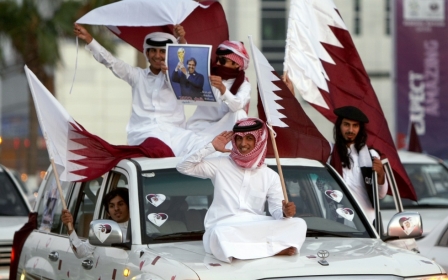Palestine goes to FIFA: The call for a sporting boycott

On 29 May, Jibril Rajoub of the Palestine Football Association (PFA) will formally propose to FIFA's annual congress in Zurich that it suspend the Israeli Football Association (IFA) from membership. If passed this dramatic measure will isolate Israel from all international football competitions.
It's not as if it hasn't been coming. For two years the PFA has threatened to press for sanctions against Israel, and its submission of the current proposal signals utter Palestinian frustration with FIFA's inability to negotiate redress of its long-standing grievances. These include Israel's ongoing obstruction of travel for matches and training, its freezing of the development of facilities and of imports of equipment, as well as the Israeli army’s frequent and brutal treatment of individual footballers. “We don’t need any more promises,” insists Rajoub, “that only serve to prolong our footballers’ suffering.”
The text of the PFA proposal makes a number of demands - that IFA should recognise the rights of Palestinians to pursue football without obstruction, but also that it should eject illegal settlement teams from its leagues and crack down seriously on racism.
The Israeli response has been predictably hostile. IFA's Rotem Kemer has accused the PFA of “a blatant attempt to mix sports with politics,” while insisting that “the Israeli union did everything it could in order to enable proper athletic life [in Palestine].” His claim drew a swift rebuttal from Rajoub. At the same time Israel's Foreign Ministry has launched a systematic propaganda offensive, organising over a hundred meetings with sports ministers and football association leaders around the world - at which, Haaretz reports: “incriminating information” has been shared concerning Palestinian footballers' alleged links to terrorist activity.
This is not the first time Israel has sought to link footballers to terrorism. On the eve of last year's congress, its sports minister wrote to FIFA president Sepp Blatter, confidently declaring that the detained striker Sameh Maraabah had acted as a clandestine courier for Hamas. In fact Maraabah had been arrested at the border after volunteering the information that he was carrying donated funds to deliver to the chairman of his club.
It is not hard to make sensational accusations against sections of Palestinian society, since 40 percent of the male population of the Occupied Territories has been detained by Israel at some point in time.
For his part, Sepp Blatter regards the suspension of football associations as contrary to “the sporting spirit”. For the past two months, he has devoted his considerable talents to the search for a last-minute compromise settlement that would convince the PFA to withdraw its proposal.
Last week, having met with Benjamin Netanyahu and Mahmoud Abbas, he announced some unexpected Israeli concessions - the creation of a VIP “escort service” to usher footballers speedily through the checkpoints, plus tax exemption for sports equipment so as to allow the fast-tracking of imports.
PFA has reacted with scepticism, partly because within a day of Blatter's announcement Sameh Maraabah had once again been detained. This time it was for just three hours while en route to a training camp. Rajoub noted in an open letter that Israel's promises “are only words unless they are included in a solution that can only come through, and be guaranteed by, the FIFA Congress”.
It remains to be seen whether the 209 delegates to FIFA congress will be impressed by Israel's concessions on travel and equipment imports. They might legitimately ask why Israel would seek to label Palestinian footballers terrorists one minute, only to offer them VIP travel status the next. Would a country with genuine concerns for its citizens' safety make such an offer? Or has Israel's “incriminating information” been little more than a smear campaign with racist overtones?
PFA will certainly make that claim. They will also rebuke the IFA for ongoing racist offences, in particular its failure to tackle the long-term discrimination and anti-Arab violence prevailing at leading Israeli club Beitar Jerusalem FC - and they may mention the racial segregation of the Israeli children's league in the al-Shomoron region, which the IFA has gone to court to defend.
None of this will play well for Israel. The fight against racism is a key battleground for FIFA, and Sepp Blatter has insisted on “zero tolerance and strict punishments everywhere”.
Above all, the PFA will demand protection of its integrity as a national football authority. IFA's admission of settlement teams into its ranks strikes at the heart of this, just as the settlements themselves strike at the integrity of Palestine.
Blatter admits that Israeli teams on Palestinian territory “could be a problem” - code for a clear breach of FIFA's statutes - but even the veteran operator will struggle to extract Israeli concessions on this point.
It is one thing to talk of speeding footballers through the checkpoints because if it happens it will not impinge on the daily lives of Israelis. But it is quite another for Netanyahu to pick a fight with West Bank settlers, so soon after soliciting their votes.
Will FIFA congress vote to suspend Israel on 29 May? Both sides in the dispute have predicted a favourable outcome, but Israel's staunchest supporter, Michel Platini of the Union of European Football Associations (UEFA), struck a different note when he warned IFA representative Avi Luzon that “this time it is serious”.
For the Boycott, Divestment and Sanctions movement (BDS), the very appearance of the PFA proposal on the congress agenda has been a major victory, taking the message to a vast new audience, but more is needed. To borrow from Rajoub's words, football should be “a vehicle of peace, not a tool to whitewash occupation and apartheid”.
- Kenneth Fryde is a human rights activist and a member of the Red Card Israeli Racism campaign.
The views expressed in this article belong to the author and do not necessarily reflect the editorial policy of Middle East Eye.
Photo: FIFA president Joseph Blatter (L) and Palestine Football Association president Jibril Rajoub speak to the press, near the West Bank city of Ramallah, on 20 May (AFP)
Middle East Eye propose une couverture et une analyse indépendantes et incomparables du Moyen-Orient, de l’Afrique du Nord et d’autres régions du monde. Pour en savoir plus sur la reprise de ce contenu et les frais qui s’appliquent, veuillez remplir ce formulaire [en anglais]. Pour en savoir plus sur MEE, cliquez ici [en anglais].





